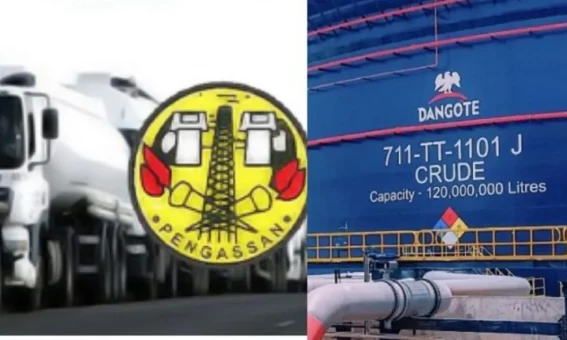
Samuel Kanu
A storm is raging in Nigeria’s oil and gas sector as the Petroleum and Natural Gas Senior Staff Association of Nigeria (PENGASSAN) locked horns with the Presidency following Vice President Kashim Shettima’s fierce defence of Aliko Dangote and his multibillion-dollar refinery project.
What began as an industrial dispute has now morphed into a national debate about power, patriotism, and protectionism — with accusations of sabotage, economic blackmail, and political interference shaking the very foundations of Nigeria’s energy sector.
The crisis erupted after PENGASSAN shut down key oil and gas facilities in protest over the alleged sacking of 800 workers by the Dangote Refinery for joining the union. The move disrupted power generation and petroleum supply nationwide, forcing the Federal Government to intervene.
But while calm briefly returned after government mediation, the flames reignited on Monday when Vice President Shettima, speaking at the 2025 Nigerian Economic Summit in Abuja, issued a sharp rebuke to the union.
“Aliko Dangote is not just an individual — he is an institution,” Shettima declared. “No one should hold Nigeria to ransom over a minor labour dispute. Nigeria is greater than PENGASSAN.”
Shettima’s comments, intended to rally support for domestic investors, struck a nerve within the labour movement. His passionate defence of Dangote — whom he called “a pillar of Nigeria’s economic development” — triggered an immediate and fierce backlash from the union.
Within hours, PENGASSAN President Festus Osifo hit back, accusing the Vice President of bias and insisting that no one, not even Dangote or the Presidency, is above the nation’s laws.
“The nation is bigger than Dangote, the way it’s bigger than PENGASSAN or the Presidency,” Osifo shot back. “If our members are sacked again, we will take the same action. Nobody can silence the union.”
Osifo, who also doubles as President of the Trade Union Congress (TUC), dismissed threats that the Federal Government could dissolve PENGASSAN, asking pointedly: “Does the law prohibit workers’ right to strike?”
As the war of words intensified, street protests erupted in Kaduna, with demonstrators rallying under the banner of Partners for National Economic Progress (PANEP). The protesters, waving placards reading “Protect Local Refining” and “End Fuel Import Cartel”, accused PENGASSAN of playing into the hands of powerful fuel importers bent on frustrating local refining.
“This is not a labour struggle,” said PANEP leader Igwe Ude-Umanta. “This is economic sabotage. The same cartel that destroyed Nigeria’s public refineries is now trying to strangle the Dangote refinery. We will not let them succeed.”
Some protesters even branded PENGASSAN’s strike as “economic terrorism”, urging President Bola Tinubu to take decisive action. They demanded that local refineries, including Dangote’s, be given crude oil at the same rate as foreign refiners to sustain operations and attract more investors.
Meanwhile, the internal crisis within PENGASSAN deepened after its national body dissolved the Nigerian Gas Infrastructure Company (NGIC) and Nigerian Gas Marketing Limited (NGML) chapters for allegedly refusing to shut down gas supply to Dangote Refinery during the strike.
The affected members have petitioned the national secretariat, describing the dissolution as unjust and warning that punishing loyal members could destroy future union solidarity.
In a twist, Dangote Petroleum Refinery issued a statement thanking President Tinubu for his “timely intervention” that prevented a total breakdown in Nigeria’s energy sector. The company praised the National Security Adviser, Nuhu Ribadu, and several cabinet ministers for “working tirelessly into the wee hours” to avert what it described as “the disruptive actions of PENGASSAN.”
The refinery hailed the government’s actions as “a patriotic defence of Nigeria’s industrial sovereignty” — a statement that further infuriated union leaders, who insist that their strike was a lawful defence of workers’ rights.
Economists warn that the ongoing standoff could undermine investor confidence in Nigeria’s fledgling industrial revival. The Dangote Refinery, touted as Africa’s largest, is seen as the cornerstone of President Tinubu’s drive to end fuel importation and stabilise the naira.
But with labour tensions boiling and accusations flying from all sides, the country’s economic reform agenda risks being overshadowed by deepening mistrust between government, industry, and labour.
As one senior union member put it bluntly:
“You can’t build a strong economy by silencing workers. If this continues, Nigeria will not just lose investors — it will lose its soul.”
For now, the nation watches as two powerful forces — labour and capital — square off in a confrontation that could reshape Nigeria’s energy future.
